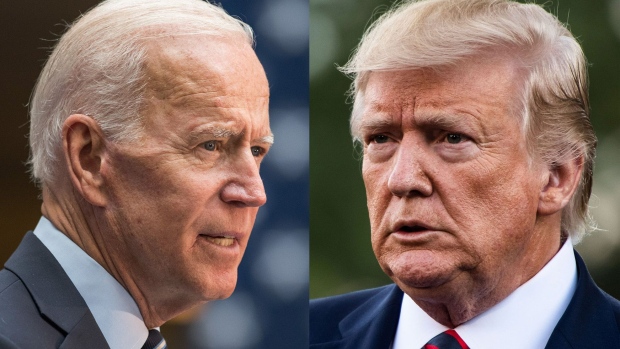Oct 15, 2020
Trump, Biden plan dueling TV events Thursday instead of debate
, Bloomberg News

President Donald Trump’s refusal to hold a virtual town hall debate with Democratic nominee Joe Biden after his hospitalization for the coronavirus has created one of the stranger events of the 2020 campaign -- two town halls, each featuring a candidate, before different audiences in different cities at the same time.
The concurrent hourlong events -- starting at 8 p.m. New York time with Trump on NBC and Biden on ABC -- threaten to fracture television viewership, making it harder for the candidates to deliver their messages to a broad audience.
Even so, the event will give Trump one of his highest-profile opportunities before the Nov. 3 election to reverse his slide in polls that show Biden ahead.
Instead of sparring with each other over topics such as the coronavirus pandemic, the economy and health care, the town hall format typically gives the candidates a less contentious opportunity to lay out their positions, and engage one-on-one with voters about issues they care about.
Trump backed out of the originally scheduled debate for Thursday that was planned as a town hall format. His campaign rejected revised plans by the nonpartisan Commission on Presidential Debates for the candidates to appear remotely after Trump was hospitalized for COVID-19, insisting that the president and his aides, a number of whom have also tested positive for coronavirus, posed no health risk.
A group of more than 100 actors, writers and producers complained in a letter to Comcast Corp. and NBCUniversal about its decision to air Trump’s town hall opposite the Biden event. The letter, reprinted in publications such as Variety, called it “a disservice to the American public.”
“We believe this kind of indifference to the norms and rules of our democracy are what have brought our country to this perilous state,” according to the letter, signed by director J.J. Abrams, actor Jon Hamm and writer-director Aaron Sorkin.
NBCUniversal didn’t immediately respond to a request for comment.
At a rally in Greenville, North Carolina, on Thursday, Trump complained that NBC had asked Biden easy questions at a recent town hall. “They asked him questions that a child could answer,” Trump said, even though it was largely voters doing the questioning.
He also suggested Biden may struggle at Thursday night’s event on ABC. “I’d like to watch him because I want to see if he can make it through the program,” Trump said. “And honestly they’ll be so soft.”
With 19 days until the election, early voting is already underway in two-dozen states. In-person and mail-in voting are surpassing records amid concerns about Covid-19 transmission at polling places and what strategists in both parties say is heightened interest in the race.
The pandemic, which has killed more than 216,000 in the U.S. and left millions infected, is sure to be a top topic among voters’ questions for each of the candidates.
Two-thirds of registered voters say the president failed to take appropriate precautions against the virus, according to a Washington Post-ABC News poll released over the weekend. Biden has hammered Trump for his cavalier approach toward the pandemic.
The president has spent recent days downplaying the threat posed by the virus, touting an experimental antibody treatment he received while hospitalized and saying social-distancing measures advocated by Democrats did more harm than good.
“The cure cannot be worse than the problem itself,” Trump said Wednesday in remarks to the Economic Club of New York.
Both candidates are also likely to face questions about the Supreme Court. The town halls are taking place during the confirmation process for Trump’s high court nominee, Amy Coney Barrett.
Democrats argue that the nomination shouldn’t be considered while voting for the next president is under way. They’re warning that Barrett could cast a deciding vote to overturn the Affordable Care Act, which has become increasingly popular. The president and his campaign aides, meanwhile, see the nomination as a way to activate conservative and religious voters who care deeply about the court’s composition.
Trump and other Republicans have been pressing Biden to say whether he supports adding seats to the court, or “court packing,” an idea that has support from progressives who see it as the only way to regain a majority as conservatives appear on track to hold six of the court’s current nine seats.
After weeks of ducking the question, Biden said Monday that he’s “not a fan of court packing” but still left open the possibility. Trump has argued that Biden’s refusal to answer is evidence that the former vice president is a puppet of the more extreme elements of the Democratic Party.







